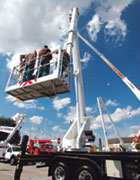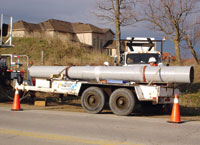 |
| Up There. Equipment manufacturers enjoyed a record turnout at this years Kentucky utility show. (Photo by Tudor Hampton for ENR) |
Inventories for many types of construction materials and off-road machines are dwindling as emergency crews along a battered Gulf Coast continue to suck up items needed to repair downed power lines and other infrastructure. Suppliers are upping production, but thick backlogs are delaying the arrival of items elsewhere in the U.S.
The shortfall could slip well into early next year. "All of our inventory for distribution materials is gone," says Tim Hughes, vice president of Hughes Bros. Inc., Seward, Neb. The manufacturer of power line hardware is running three shifts to fulfill orders, with lead times stretching out as far as 12 weeks. "Its definitely difficult to keep material in front of the line crews," adds Patrick Lavigne, spokesman for the National Rural Electric Cooperative Association, Arlington, Va.
Andy Schwalm, sales manager for Victor Insulators Inc., Victor, N.Y., says that Hurricane Katrina "pretty much depleted any stock that we had," and that "attempts to rebuild that stock were sidetracked by [Hurricane] Rita."
Utility owners outside of the Gulf Coast area may have to wait several weeks to get pin-type insulators, which are installed along electrical lines and are some of the most common items knocked out by storms. Shipping delays for those products are expected to last for another four to eight weeks.
Manufacturers of utility materials and tools typically ramp up production prior to the hurricane season, but many this year did not expect two large storms to pound the same region. Vendors fielded questions about the problem at this years International Construction and Utility Equipment Exposition, held Sept. 27-29, in Louisville, Ky. The biennial show brought in 15,160 visitors on the first day, surpassing its record in 1999. About 200 utility professionals from the Gulf region canceled their trips to Louisville but had little impact on attendance. "Weve seen no drop-off that is different from any other year," said ICUEE Show Manager Nicole Hallada.
 |
| Pole Position. Composite maker offers shorter delivery times than other materials. (Photo courtesy of Resin Systems Inc.) |
The outdoor aisles were packed with utility owners, contractors and laborers looking to buy. Marty Reynolds, an account manager for Border States Electric Supply, Billings, Mont., said, "Right now, we are seeing insulators and braces in short supply." He noted that contractors have flooded his company with orders over the past month. "Were probably buying four times what we normally would buy," he said.
Manufacturers of non-traditional construction materials also see an opportunity to cash in on the shortfalls. "In years past, there has always been an ample supply of round, wood poles," says Sid Kamprath, marketing director for Laminated Wood Systems Inc., Seward, Neb. But during this years storm season, his company has received multiple inquiries from Texas utility owners for its premium-priced, custom-engineered transmission poles, "a direct result of Hurricane Rita," he claims.
The same goes for other brands of alternative products. Richard Rose, regional sales manager for Resin Systems Inc., a manufacturer of composite utility poles in Alberta, Canada, says his company is likely to benefit from tight supplies of wood and steel poles as well. His companys new modular poles, made of fiberglass and a patented polyurethane resin, have competitive delivery times, at two to three weeks.
The storm of new business has forced off-road manufacturers to increase production, while equipment prices this year are up as much as 7%. Orders for debris-removal items, such as brush cutters and stump grinders, are particularly high. "Weve had a huge demand for our environmental equipment from the storms," says Mary Vermeer Andringa, president and CEO of Vermeer Manufacturing Co., Pella, Iowa. "Whatever we are making is going on the truck."

Post a comment to this article
Report Abusive Comment